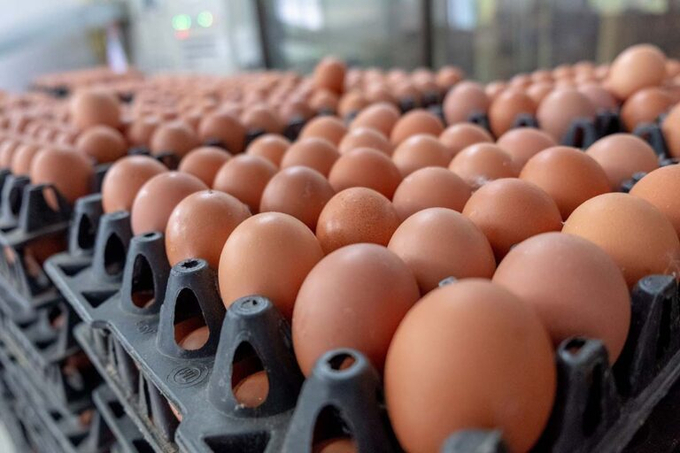June 18, 2025 | 19:19 GMT +7
June 18, 2025 | 19:19 GMT +7
Hotline: 0913.378.918
June 18, 2025 | 19:19 GMT +7
Hotline: 0913.378.918

The Omelette project wants to reach 3 main target groups: the laying hen sector, local authorities and the consumers. Photo: Canva
The objective of project Omlette is to let poultry farmers and the poultry sector in the region embrace solutions that actively contribute to improved hen longevity with ensured animal health and welfare, egg quality and economic viability as major factors for a future-proof, resilient sector. The international project also wants to bridge the gap between egg producers and their customers, officials and consumers.
The leading partner of Omelette (optimise and extend hen longevity to expedite the transition to sustainable eggs) is the Experimental Poultry Centre in Geel near Antwerp, Belgium. Among the other participants are the universities of Leuven (Belgium), Osnabrück (Germany), and Bern (Switzerland), the French Agency for Food Environmental and Occupational Health and Safety as well as several companies from the Netherlands and France.
The project is an initiative of the Interreg North-West Europe, based in Lille, France. The EU supplied €3.7 million of the total budget of €6.3 million. The project will run until 2028.
Omelette wants to reach 3 main target groups: the laying hen sector, local authorities and the consumers, explained project manager Nathalie Sleeckx of the Belgian Poultry Centre.
“Firstly, focused training schemes and broad communication will be targeted at current and future farmers and their advisors to increase knowledge and change behaviour so that sustainable hen longevity will become standard practice in a future-proof, resilient North-West Europe egg production,” she said.
“Next, Omelette will try to close the gap between farmers and local authorities and between farmers and consumers. Demonstrations at pilot locations targeted at authorities or consumers will increase knowledge of the origin of eggs, of the challenges but also of the efforts the sector has already undertaken, leading to an increased awareness and an easier dialogue between all involved parties,” she added.
Sleeckx added that the Omelette project aims to support the egg producing sector in North-West Europe in evolving towards being future-proof, sustainable and resilient. “Hen longevity will be an important part of this evolution with a strong emphasis on animal health and welfare. Although the region is important for egg production, the sector is confronted by both territorial and common EU challenges. Combining all the requirements for sustainability, environment, animal health and welfare makes it very challenging. In Omelette, the 11 partners will cooperate transnationally to bring together multidisciplinary knowledge and skills needed to jointly overcome obstacles and stimulate the adoption of hen longevity in the field.”
Additionally, smart digitalisation will be integrated and reinforced to improve individual behavioural monitoring and entire flock follow up. A structured and formal approach for continuous improvement will result in more proactive management that directly improves hen longevity, the partners hope.
Proactive farm management will be achieved through driving motivational change of farmers and advisors to embrace smart digitalisation and evidence-based decision-making. This allows for the early detection of upcoming points of attention and (preventive) interventions at an early stage enabling sustainable hen longevity and animal welfare.
Vice-governor for agriculture at the Province of Antwerp, Kathleen Helsen: “The egg is more than a breakfast snack. With an average consumption of 210 eggs per person, per year in our region, the importance of eggs can hardly be underestimated. Here in the province of Antwerp, we strive toward international knowledge-sharing to evolve to future-proof, resilient and sustainable egg production in North-Western Europe in this Interreg Omelette project. The partners will address current and future poultry holders with targeted training schemes and varied communication. Together, we can achieve sustainable longevity of poultry.”
(Poultryworld)

(VAN) Extensive licensing requirements raise concerns about intellectual property theft.

(VAN) As of Friday, a salmonella outbreak linked to a California egg producer had sickened at least 79 people. Of the infected people, 21 hospitalizations were reported, U.S. health officials said.

(VAN) With the war ongoing, many Ukrainian farmers and rural farming families face limited access to their land due to mines and lack the financial resources to purchase needed agricultural inputs.

(VAN) Vikas Rambal has quietly built a $5 billion business empire in manufacturing, property and solar, and catapulted onto the Rich List.

(VAN) Available cropland now at less than five percent, according to latest geospatial assessment from FAO and UNOSAT.

(VAN) Alt Carbon has raised $12 million in a seed round as it plans to scale its carbon dioxide removal work in the South Asian nation.

(VAN) Attempts to bring down the price of the Japanese staple have had little effect amid a cost-of-living crisis.